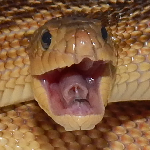|
Fraction posted:That... that sure was something, alright. Parts of it were understandable (i.e. distracting from triggers), but other parts were just uhhh yeah. Ask your dog to eat and then move in its path and forbid it to do so. Sure, okay. Yeah, I dunno, isn't pack theory essentially... dominance theory? Is she just retarded and confused or have I actually missed something?
|
|
|
|

|
| # ? Jun 4, 2024 17:00 |
|
Skizzles posted:Lookit that (LONG) face. Sounds like crap to me. Even the parts that kind of sound okay are crap. All of it is seriously outdated. Donated time is nothing to turn your nose up at, but I would worry about treating a shelter dog with possible issues the way she suggests. It's an improvement over other methods, I guess.
|
|
|
|
Yeah I pretty much called her out on everything and she's like, quote:i didn't say block him before he eats i simply said let him eat while your standing there and do positive reinforcement and kinda do a body block to test getting closer to the food...then pick it up before he claims it...then do some more training sit down whatever and then put it back down....i guess the way i said it was confusing...i never said call him over don't let him eat and block him geese I'm pretty sure you meant "geez" not "geese," lady. edit: Also I have some backup 'cause one of the ladies in our little shelter group knows Sophia Yin personally and can vouch for my counter arguments. Skizzles fucked around with this message at 03:05 on Aug 6, 2011 |
|
|
|
Skizzles posted:Yeah I pretty much called her out on everything and she's like, I read the tail end of the convo Miss Posi-Dom had with Skiz and the woman kept saying dogs "smell" storms and to wait for them to smell it... As if smelling a storm was the only way dogs detect changes in weather. I let in a little tip that they can also detect changes in barometric pressure far sooner than we can so if you really want to look for your dogs signs of anxiety prior to storms don't wait for it to "smell" like rain.
|
|
|
|
I was just glad she didn't say static electricity.
|
|
|
|
We recently adopted a second great dane, Leon. This guy is 15 months old, 120 lbs. Kind of nervous, energetic, ill-mannered, poorly trained and all that. On top of it, his former owners fed us some... inaccurate information concerning his relationship with cats. We can deal with training in general, but I would like some suggestions on how to get him to calm down with the cats in general. Our other great dane is half this guys age and a saint, even though her training has slipped... Leon salivates and whines at the cats. At first introduction he chased one of them, a kitten. The other two cats went high, turned around and beat his rear end. He has just been neutered and had a gastropexy, so is on mild pain meds and stuck in a crate for the next few days (he acts like nothing happened). His tail does wag, and before attempting to chase the first cat he met, he did just sniff aggressively, so that gives me hope. But if a cat just walks by while he is in the crate, he whines. Any advice on how to get him agreeable?
|
|
|
|
Kudaros posted:We recently adopted a second great dane, Leon. This guy is 15 months old, 120 lbs. Kind of nervous, energetic, ill-mannered, poorly trained and all that. On top of it, his former owners fed us some... inaccurate information concerning his relationship with cats. What I did with my dog, who wanted to eat the cats, was teach her a really solid "leave it" and rewarded her when she saw the cat and looked away. I also made sure my cats had places to escape from her, cat trees, baby gates, etc. Over time she went from wanting to eat the cats to wanting to play with them. Now she mostly ignores them, but likes to lick one of them. For the first 3 months she was never unsupervised around them.
|
|
|
|
Fraction posted:What sort or 'style' of reactivity does he have? Lunging, barking, snarling, snapping, biting? All of the above? You say his biting is related to a lack of bite inhibition, but even so he really wouldn't greet a dog by biting them simply because of that - that is aggression. He gets a fair amount of activity. Currently he has four dogs we exercise him with. Sadly he gets no off leash time because dog parks aren't an option for him. I am currently clicker training him. We go on daily walks or jogs. We also provide him with toys and raw hide. We have a new issue of him barking through the window for no reason though. I call him and use a happy voice and pet him when he gets near me but it doesn't seem to stop him at all. He'll just do quieter barks. His reactivity is LOTS of lunging. He growls and barks and jumps straight up in the air like a gazelle. He's super hard to handle. The reason I have to use the prong collar is that I'm a tiny gal and he pulls me down and drags me. I've got scars and been terribly bruised. With the pronged collar I can handle him and not get injured. quote:If he knows your friends dogs, then why not arrange a meeting outside? You can work on approaching a dog that he probably won't recognise from a vast distance, and slowly decrease the space between them. When he realises that he knows this dog, he'll be thrilled. Your dog doesn't have to be reactive to another dog in order to practice the basics of counter-conditioning with it. If he meets a dog he knows on the leash he doesn't have a problem, so unfortunately that wouldn't work. I did just call up the Borzoi rescue woman that lives about half an hour away. She agreed to work with me one evening with her older and calm Borzoi at her place. quote:What do you mean, invasive with sniffing? And how did you correct that? Oh this isn't really a problem. I just told forceful sniffing is a slight dominance thing, though he's definitely not the dominant one in the house. That would be my 8 year old Silken Windhound who is totally chill. quote:If he's non-destructive outside of the crate (other than counter surfing, etc) then could you shut him into a different room, so he doesn't have access at all to the kitchen? Maybe try shutting him in the bathroom, or your bedroom, etc. My pup used to have serious crate fear, going from silent to screaming in seconds, but would generally be quiet if just left in a room when I had to go. I can't. The only room to put him in is the bedroom and if I do that he pees on the mattress. I have a very nice mattress 
|
|
|
|
Kudaros posted:We recently adopted a second great dane, Leon. This guy is 15 months old, 120 lbs. Kind of nervous, energetic, ill-mannered, poorly trained and all that. On top of it, his former owners fed us some... inaccurate information concerning his relationship with cats. i just want to say I'm sorry and know how you feel. I was fed a lot of misinformation too, especially about the cats and I have four. My method was to put my dog in his crate and put the cat in a carrier next to them, so they could see each other and the cat couldn't hightail it to the closet. When our dog started ignoring the cat I'd give him a treat. The cat sure wasn't happy about it but it helped him get used to them. he still tries to play with them but now it's as friends and not prey. They still hate his guts though 
|
|
|
|
Well someone else in our shelter group saw me countering that retarded "trainer" and sent me a message:quote:I noticed your great posts on dog behavior & co., and was wondering if you had any ideas for me on something.. Now... maybe it's 'cause it's 4:00 in the morning and I just got up (hooray storms), but my mind is having trouble grasping what she's asking and I'm not entirely sure how to help her out here. My only knowledge of behavior is from being a nerd who has read books/articles from respected vets/behaviorists and talking to trainers over the past year or so. And I don't know any CPDT's(?) or behaviorists in the area. I know one Petsmart trainer who, judging by her own dogs, is a pretty good trainer, but eh. I do also kinda know the founder of Slugger City Bully Buddies, who is working on a degree in behavior, so maybe she'd be willing to help out. At an event she recognized me from Petsmart adoptions and then added me on Facebook. I had no idea I was that memorable/popular. I do know I don't want our DISMAS workers to have anything to do with evaluations (other than maybe being there if things go sour and the dog gets too aggressive maybe). I'm all for second chances and the DISMAS program is cool, but we've had too many gently caress-ups caused by them at my shelter (kennels improperly cleaned, dogs stolen, money stolen). I'm sorry if this is kind of a retarded request, but any advice?
|
|
|
|
I just got off work, so maybe I can help. I think she's asking for advice on how to do the behavior evaluations within the organizations system? And is asking for recommendations of who she should go to for further advice on the behavior part of her potential job. The second part is her general plan that she wants advice on as well. It's kind of stream of consciousness though.
|
|
|
|
A trainer who I follow on facebook posted this. I thought it was great, and am reposting it here. She trains dogs for the highest level of competitive obedience, so that's her primary focus here. But pet dog owners can get something out of it too. Denise Fenzi posted:I never made a decision to stop using corrections; it just happened when I realized I didn't need them anymore. Then I found that, over time as my skills improved, I didn't need them with my students either - I can teach my students to train their dogs simply by making them better trainers. It wasn't a moral decision UNTIL I started to teach more and more people, and realized how thoroughly incompetent many competition trainer are, never mind the average pet person. And as I watch trainers do very poor training and then correct the dog because the trainers don't' know what they are doing, it sort of begs the question....why is the dog being held responsible for the person's lack of skill? For a competition event the dog never chose to do?
|
|
|
|
vstheworld posted:
What about a head collar? The problem with using a prong is that you're highly likely to create the association between seeing a dog and experiencing an unpleasant sensation. It compounds on the reactivity. Prong collars are absolutely the wrong tool to be using for your problem. I understand the issue, but unless you can find another option you're kind of shooting yourself in the foot here. Read I would seek professional help from a veterinary behaviourist. I think some hands on, personal attention from a professional intimate with your situation would be beneficial. They might suggest meds to control some of the anxiety that he seems to be feeling. edit: Skizzles posted:Well someone else in our shelter group saw me countering that retarded "trainer" and sent me a message: I'm not too sure what she's asking either. Behaviour assessments should be done by someone intimately familiar with the process. This video shows a dog who apparently failed its temperament test, and as a result will be euthed. From where I'm sitting, that dog did remarkably well, and I don't agree with the assessment at all. Without experience, these sorts of mistakes happen a lot. I read about a shelter someone visited recently that had cookies in baskets outside the kennels (not just lovely milkbones either -- all sorts of tasty stuff). There were signs that said, "Even if I'm barking toss in a treat." I thought it was a great initiative to help calm dogs in an innately stressful environment. Perhaps it's something she could look into implementing herself? If you figure out more of what she's asking, I'm all ears. She sounds like she's got some lofty goals, and they sound great. a life less fucked around with this message at 17:50 on Aug 7, 2011 |
|
|
|
vstheworld posted:He gets a fair amount of activity. Currently he has four dogs we exercise him with. Sadly he gets no off leash time because dog parks aren't an option for him. I am currently clicker training him. We go on daily walks or jogs. We also provide him with toys and raw hide. It sucks that you can't give him off leash time. I honestly don't know how you guys with leash laws deal with exercising reactive dogs, I couldn't really take either of mine to a specific dog park but Lola can run around at our normal park. Could you maybe add in another 30 minute jog or two in the daily schedule? Ideally you want him as tired as possible whilst working on this. vstheworld posted:We have a new issue of him barking through the window for no reason though. I call him and use a happy voice and pet him when he gets near me but it doesn't seem to stop him at all. He'll just do quieter barks. This sounds like a mix of boredom/frustration and learned aggression. If he was bored one day, saw some dogs out of the window and barked at them, and then they went away, then barking out the window is a good thing in his eyes. He could be barking because he's bored, and/or to keep other dogs from approaching, because if his barks make other dogs go then why not keep on barking to make sure none come past? I'd block his ability to go to the window whilst you're working on his reactivity in general. vstheworld posted:If he meets a dog he knows on the leash he doesn't have a problem, so unfortunately that wouldn't work. I did just call up the Borzoi rescue woman that lives about half an hour away. She agreed to work with me one evening with her older and calm Borzoi at her place. Will he not even react if they're far enough away that he knows "a dog" is there, but not too close so that he realises he knows the dog? Or is he only really reactive when dogs are pretty close? It could be that he's actually picking up cues from you, too - if you know that he knows and will be okay with the other dog then you're relaxed, and so he's more inclined to relax. Is it just you who walks him, and if not is he the same reactivity-wise with other people? a life less posted:This video shows a dog who apparently failed its temperament test, and as a result will be euthed. From where I'm sitting, that dog did remarkably well, and I don't agree with the assessment at all. Without experience, these sorts of mistakes happen a lot. I saw that before, it's way too depressing. It seemed more like the behaviourist had a problem with the dog than the dog itself having any aggression issues. Lola just stayed calm and quiet as a young couple with a kid on the man's shoulders walked past when we were out, even though they were talking amongst themselves and looking at her. They went past about a metre away and had come quickly round the corner to end up face to face with me and her. Good girl. She's dealt with other the past two days: children appearing suddenly behind her, a young man with an afro walking behind and then past us, a man saying something briefly to me, and of course the usual town things. She's coming along great. Her main trigger at the moment is people talking to her (or even often to me, but since they often talk to me and look at her I don't think she knows there's a 'difference'). I just try to avoid talking to people, and try not to let her get wound up if people talk to her (since I can't ask them to leave her alone when I'm trying to talk to her myself and keep her focus). I guess to deal with this, just increase the flow of treats when people talk to her and try to get her out of the situation as quickly and safely as possible, at the moment? When she's doing better I'm going to ask a friend or two she doesn't know to meet me in town, and slowly work on introducing her to them.
|
|
|
|
^^^ Psyche used to have a huge problem with people talking to me, probably because they were focused in her direction. So when I had to talk to people, I would just start popping the treats until we were done. Now she'll sit and accept treats and be patient unless the person starts coming closer, which I always put a stop to. I think it's a good idea to counter-condition talking to people because it's a good way to practice "being focused on by strangers = AWESOME THING!", which a lot of reactive dogs have a problem with.a life less posted:This video shows a dog who apparently failed its temperament test, and as a result will be euthed. From where I'm sitting, that dog did remarkably well, and I don't agree with the assessment at all. Without experience, these sorts of mistakes happen a lot. Ugh, what bullshit. That dog was fine, just a little anxious about the strange doll and even if it was more than just 'new experience' anxiety, a little training probably would have eliminated any problems. Not to mention I would have liked to see how that dog would have done in a calmer environment. I pretty much have no faith in temperament testing in general, though. I can see using those techniques as part of training to test out reactions, but I don't think it's a good predictor of future behavior, especially if it's done only once. It's only one datapoint, but Psyche passed the temperament tests she had at her foster with no problem, or so I was told. I wish I had a video of that.
|
|
|
|
a life less posted:A trainer who I follow on facebook posted this. I thought it was great, and am reposting it here. This was excellent and put my thoughts into words way better than I ever could, thanks for posting it! That video is just stupid, I agree the dog did incredibly well. He could have always lashed out at the doll but instead he just cowered a bit, and even tried to happily inspect it when it wasn't coming at him. I don't understand these people.  I think a dog's behavior, temperament, and other variables should be taken into account during every interaction with the dog, not just have everything boil down to that one evaluation. The fact that a dog's life rides on that one session seems a bit unfair. I think a dog's behavior, temperament, and other variables should be taken into account during every interaction with the dog, not just have everything boil down to that one evaluation. The fact that a dog's life rides on that one session seems a bit unfair.Anyway, I responded to her basically explaining that while I had no formal background in training/behavior I'd be thrilled to do what I could and even compile a booklet on training/behavior from the articles and books I've read (all of which were posted or recommended here). I gave her a quick run-down of what to look for in a trainer/behaviorist (that is, to avoid traditional trainers and go for new school trainers) and why dominance theory is inaccurate and the methods are not the best. Also told her to contact the girl I mentioned earlier, the founder of the bully advocacy group working on her behavior degree, 'cause she already works a bit with my shelter and I think she wouldn't mind helping out. While I would love to suggest implementing the treat basket thing you mentioned, I think it would really be beyond my shelter's ability... we already struggle with getting enough basic supplies like food and bleach, let alone treats. The dogs at the nice, new shelter are behind glass anyway. The only dogs you could throw treats to are in the old, lovely, dilapidated shelter that's in constant violation of some building code or another. We just got a new director, and even though he's came from a really high kill shelter with the HSUS, I hope he can turn something around there... 
|
|
|
|
a life less posted:This video shows a dog who apparently failed its temperament test, and as a result will be euthed. From where I'm sitting, that dog did remarkably well, and I don't agree with the assessment at all. Without experience, these sorts of mistakes happen a lot.
|
|
|
|
I just met our new neighbors. I was previously told they didn't have a dog...except that they adopted a german shepard puppy two months ago. I talked to them about it and they seemed nice, but dismissive when I told them that my dog is going to hate their dog. Their dad is a trainer, which made me feel a little better until he pulled out a prong collar and told me that positive reinforcement of fear reinforces that fear. Seriously, why does life hate me? At least they said he doesn't go off leash (for now) and they don't leave him outside alone.
|
|
|
|
Had this huge reply typed out and GOOGLE ATE IT. Dammit. So this will be less detailed.Fraction posted:It sucks that you can't give him off leash time. I honestly don't know how you guys with leash laws deal with exercising reactive dogs, I couldn't really take either of mine to a specific dog park but Lola can run around at our normal park. Could you maybe add in another 30 minute jog or two in the daily schedule? Ideally you want him as tired as possible whilst working on this. Basically here there are no leash laws so all the dog parks are dog parks and none of them are fenced in. Had I known this I might not have moved here. It's hard to exercise sighthounds without a drat fence. You just have to pray they come back. quote:This sounds like a mix of boredom/frustration and learned aggression. If he was bored one day, saw some dogs out of the window and barked at them, and then they went away, then barking out the window is a good thing in his eyes. He could be barking because he's bored, and/or to keep other dogs from approaching, because if his barks make other dogs go then why not keep on barking to make sure none come past? I can put the shades down, but blocking would be impossible. He'll still hear the rattling of leashes or keys through the window but I'll do the best I can while not turning this place into a sauna. Any ideas on how to entertain him? He goes on a daily jog unless my back hurts then it's a walk. Each 30 min in length. He gets plenty of human interaction but the other dogs ignore him and seem to just want to cuddle and sleep with us humans. He also gets kongs and toys. We clicker train him 2-3 times a day. I have to admit he's a lot better behaved with me than my boyfriend because my boyfriend is not willing to interact with him or put forth any effort. He just wants him to magically be like our other dogs and act like a housecat. quote:Will he not even react if they're far enough away that he knows "a dog" is there, but not too close so that he realises he knows the dog? Or is he only really reactive when dogs are pretty close? It could be that he's actually picking up cues from you, too - if you know that he knows and will be okay with the other dog then you're relaxed, and so he's more inclined to relax. Is it just you who walks him, and if not is he the same reactivity-wise with other people? Far away he doesn't even notice them. It's not until 3/4 to 1/2 of a neighborhood block that he starts barking, and about 100 ft when he starts lunging, sometimes less. This is a huge improvement from where he used to be, but something that needs to be fixed. His reactivity is more calm with me than when my boyfriend walks him, so my boyfriend quit. He doesn't know how to deal with it and I'm not sure he's willing to try. So I've been training my boyfriend by having him walk the other two dogs while I walk Hyperion. Then I do the clicker and give him a blow job when we get back. We had a good encounter for BAT last night. No reaction til we were 20ft from the other dog, who was sitting on the porch. I did the BAT method and praised him until we got too close then turned around and walked across the street. There he was going crazy over some people in a garden because got soooo wound up. Once he calmed I had him sit, clicked, gave him a treat, then asked the people to come over and pet him. I figured this would be a good example to him of how not every thing is a spooky scary monster. He usually doesn't bark at people but it was twilight and that's the worst time to take him out.
|
|
|
|
Edit: Double post 
|
|
|
|
My new puppy, 6 months old, is so mouthy, I would almost consider it biting. It hurts. He's getting a bit better about the hands, but now he goes for the legs instead. The trainer comes by next week but does anyone have any tips on what to do until then. He doesn't get any attention when he does it. I turn around and ignore him. He only gets pets/food when he's being calm. The second his teeth touch me, he gets completely ignored. He basically does to people what he does to get the other dog to play. If he's being dangerous I grab his leash and tie him to the dining room table and just leave him there alone to calm down. It's so frustrating ahhhh. I knew he was like this when I got him but it's really hard to keep cool. When he's calm he's super sweet and just sits by my side, so that makes this crap worth it. Does anyone have any advice or just words of support that this will end? Monster in question is on the right: 
|
|
|
|
Silver Nitrate posted:
I have a dog training friend who, according to her, had the foster dog from hell. She had a bully-lab mix for 6 months, and struggled with severe mouthing/biting issues. Apparently she tried everything (what you've described and more) and what she says finally worked is YOU leaving the room. Apparently putting the dog in the other room didn't have the same affect -- she had to bodily remove herself. There was a dog in our training class who would mouth its handler horribly as a type of tantrum when the class went on a bit too long, or was kept from doing something it wanted to do. We suggested that at home you keep training sessions short, and constantly reward for anything that's not teeth-on-skin. (Dog standing next to you in a daze? Reward that poo poo!) Try to keep arousal levels low enough to not prompt toothy outbursts. I think both those tactics will still take a little while to have an effect. Keep at it, and most of all stay consistent. As I've said before, if the undesirable behaviour is rewarded even once in a while it will be more difficult to extinguish. Be prepared for an extinction burst -- the behaviour may escalate shortly before it becomes extinct. Edit: vstheworld posted:Borzoi trouble There's this blog that I really like that deals with a lot of reactivity issues called Reactive Champion. Today's post is about the possibility of medication. Some of the things the author mentioned reminded me of your problems. Check out today's post, and maybe poke around some of her older entries. http://reactivechampion.blogspot.com/2011/08/meds-and-your-dog-part-i-should-you.html a life less fucked around with this message at 02:23 on Aug 8, 2011 |
|
|
|
a life less posted:There's this blog that I really like that deals with a lot of reactivity issues called Reactive Champion. Today's post is about the possibility of medication. Some of the things the author mentioned reminded me of your problems. Check out today's post, and maybe poke around some of her older entries. Wow, thanks. I am seriously considering putting him on medication since the move to San Fran is so soon and we are running out of time. His behavior might get us kicked out of apartments or worse. He reacted today on our run and someone called him a bucking bronco. Not too far from the truth. Now to find the money for the vet bill...oh lordie.
|
|
|
|
Does anyone have any tips for teaching the return part of fetch? Krieger has no trouble chasing and getting the ball but she only returns it halfway in a very lazy manner. I know she enjoys the chase part and would like nothing more then to be able to use fetch as a tire her out game.
|
|
|
|
vstheworld posted:Any ideas on how to entertain him? He goes on a daily jog unless my back hurts then it's a walk. Each 30 min in length. He gets plenty of human interaction but the other dogs ignore him and seem to just want to cuddle and sleep with us humans. He also gets kongs and toys. We clicker train him 2-3 times a day. So he's getting either a half hour walk or jog, or both? If the former that doesn't sound like much for s young hound. Would you be able to give him another half hour walk or two? Even if he usually lounges around, extra exercise will tire him out more and make him easier to manage. If you don't already, you could try making him work for every piece of food at meal times - either by adding another two clicker sessions and giving it piece by piece, or soaking and freezing a meal in a kong. If he likes to play games with you and your boyfriend, hide and seek (either him in a stay while you hide or one person holding him until the other is ready) could be a good way to work that brain. Chachikoala posted:Does anyone have any tips for teaching the return part of fetch? Shape it. Start from scratch - click and treat for her looking at the ball, for her moving toward it when it's a foot or so away, for touching it, for mouthing it, for biting it. If you have been clicking the correct moment and then rewarding when she returns to you, she will start orienting herself back toward you when she goes toward the ball. So - click for lifting the ball, then afte a few reps withhold the click until she starts to turn her head or body toward you in anticipation and reward that. Then it's just a matter of clicking for covering the distance back to you, and generalising it.
|
|
|
|
a life less posted:
One thing I noticed was that the dog's commisures were pulled way far back almost to its ears from the start. The shelter should NOT have been doing a temperament test when the dog was already stressed and fearful to begin with. I don't know what their policy is, but the Humane Society of Tacoma and Pierce Co doesn't do their behavior assessment until the dog's been held for 3 days and has settled down a little. That dog was very literally set up to fail, and while I understand that they're probably overcrowded and that this dog is already unlikely to get adopted because of being an adult and a bully breed, the shelter executed rather than euthanized this dog.
|
|
|
|
Fraction posted:So he's getting either a half hour walk or jog, or both? If the former that doesn't sound like much for s young hound. Would you be able to give him another half hour walk or two? Even if he usually lounges around, extra exercise will tire him out more and make him easier to manage. On good days he gets an hour walk & run but most days it's 30 minutes. It's limited to my health, to be honest. I suffer back problems. when I'm feeling good he gets lots of exercise and so do I. I like the hide and seek idea........if he was smart enough to get it. Oy  At least sometimes he'll play fetch! He does love his kong. Yay for kongs! At least sometimes he'll play fetch! He does love his kong. Yay for kongs!I think we're going to try medication since we have to get him in shape so quickly and he's been stalled for so many months. It's not something I want him on permanently but at this point I think it would really help his separation anxiety and reaction.
|
|
|
|
So, minor update, the lady who messaged me about the evaluations really wants me to help put together some behavior info and be the one to help her with evaluations if she gets the job.
|
|
|
|
Skizzles posted:So, minor update, the lady who messaged me about the evaluations really wants me to help put together some behavior info and be the one to help her with evaluations if she gets the job. Congrats! That sounds like fun! I got to see the eval on my new dog and it was fascinating.
|
|
|
|
Chachikoala posted:Does anyone have any tips for teaching the return part of fetch? Get a treat, trade ball for treat when she brings it all the way back, otherwise no treat. Then, depending on the treat, you might have to wait a few seconds for her to chew the treat before you throw the ball again. Second option, ignore her until she brings the ball all the way back. Send her out for it if she returns without it. My pup had two things he would do--not bringing the ball all the way back, or bringing it all the way back and not letting go. For the first part, I did what I said above. For the second part, I kept a tug toy. As soon as I brought out the tug toy he wanted to tug, and I could grab the ball. Then as soon as one of us lost the tug game, I could throw the ball again.
|
|
|
|
ButWhatIf posted:The shelter should NOT have been doing a temperament test when the dog was already stressed and fearful to begin with.
|
|
|
|
Mouse did WAY better at puppy training this week. She was much more focused on me (freshly fried rabbit liver and kidneys probably helped) and 90% less barky. I rewarded her for looking at the other dogs and then looking back to me, and shoveled treats into her when she was sitting quietly and paying attention to me during the class talks. She did awesome in the exercises, walking past other dogs and sitting in front of them with only a couple of errant yaps. She also aced off-lead recall and the bronze level exercises that the trainer had us attempt as an experiment (bronze recall and offlead obstacle courses). We also demonstrated offlead retrieval, which none of the other pups can do at this point. Could not be more pleased with her tbh
|
|
|
|
I think some folks with reactive dogs might be helped by what I'm working through now. I recently adopted an 8 month old Australian Shepherd rescue (Luciana) from the local Humane Society. Perfect behavior except that she was initially dog reactive and quickly became reactive to people and cars too. Lunging at the leash and barking, visibly anxious but tail up and wagging in a non-aggressive manner. She picked up loose leash walking quickly but it's all out the window as soon as she gets amped up. I'd been trying to countercondition with treats and only seen backward progress (this has continued for the five weeks I've had her so far). Upped her exercise to ~2.5-3 hours of brisk walking a day and 3 ~10-15 min training sessions plus whatever fetch and home activities I could add. Switched her feeding over to a Kong instead of a bowl and now have a food dispensing toy that she loves, takes her about 45 minutes to eat a meal out of it and she's engaged the whole time. Tried calming tablets and melatonin. Nothing put a dent in her reactivity. I signed us up for a reactive dog class (6 dogs separated by screens with two trainers) but she couldn't handle it and most of the first two classes were spent with us outside the room trying to get her to calm down. The trainer suggested we move to private training and we had our first session last Saturday. It actually ended up being three trainers who were all really great (I guess they were just hanging around and the one I was working with pulled them in). They ran through some of the counterconditioning with a dog doll and a child doll (either are enough to send Luciana lunging) and seeing that it didn't seem to be having much effect on her mental state suggested I try punishment. I'd been R+ only with her so far so I was initially skeptical but we did an exercise where I'd approach the doll with her and as she went over threshold she got squirted from a water bottle by one of the trainers. Twice was enough that she was nicely approaching both dolls and being remarkably normal towards them. Trainer suggested I take the next week and avoid the outdoors as much as possible to try and avoid any reactive episodes before our next session. FYI something they noted is that they don't want me doing this myself so as not to change my relationship with her. This is the only positive change I've seen in five weeks and has me quite hopeful. Regardless adopting her has been wonderful! Bonus pic 
|
|
|
|
novamute posted:I think some folks with reactive dogs might be helped by what I'm working through now. Wow, I find it...very surprising that that worked. Are you sure that you didn't just shut down the behavior? Was your dog looking happier about being around the dolls or tense? Did you do any normal things around the dolls, like your dog's favorite tricks? Did the trainers explain their rationale for why startling the dog would decrease reactivity and not just suppress it? I would be very interested to hear about your next session. I don't want to be a downer, but I would guess that it won't work again. I hope it does though, all dogs are different and respond to different things. Edit: I agree with a life less. I was trying to be hopeful but I can't see how this will change your dog's attitude. Suppressing reactivity can be very dangerous because when your dog does go over threshold, it will be without the sub-threshold warning and may be more violent. I don't honestly think you'll get that far though, I imagine your dog will be reactive again the next time you try this. Also, to give some perspective on time, we are coming up on the one year mark with our dog and while she has made progress, she is still reactive. I'm not saying you need to count on spending a year on this, my dog is particularly reactive, but be patient and make sure you think about long-term progress when trying techniques. Kiri koli fucked around with this message at 20:38 on Aug 9, 2011 |
|
|
|
novamute posted:I think some folks with reactive dogs might be helped by what I'm working through now. Your dog is absolutely gorgeous. I'm very very very very very uneasy about you using punishment to treat reactivity. The only way I could imagine it being successful is to snap her out of her fit, THEN you apply counter conditioning. If all your doing is squirting her with water each time she shows she's afraid of something then you're not doing anything to treat that emotion -- you're just looking to treat the symptoms, not find the cure. Hopefully your trainers said as much to you. Part of the reason why you might not have seen much/any progress is that you said you've had her for 5 weeks. That's no time at all as far as conditioning is concerned. It's generally a good idea to stick with one method for a good few months before you determine whether it's helping or not. Honestly I'd try meds before I tried punishment for reactivity.
|
|
|
|
This is less a question and more a thank you to all the people who've helped me when I asked about training Bailey! I had a friend pet sit him while I was out of town last week and she told me how much of an improvement in his manners (especially leash manners), reactivity to cars, and other behaviors she saw. Sure, I work pretty hard with him, but without a lot of the suggestions from you guys, I don't think I'd ever have him as happy and well behaved as he is currently or feel like I have an idea of what I can do to shape or train new behaviors. I feel like the next few steps for me are getting him into his head collar and then some actual dog training classes!
|
|
|
|
a life less posted:Your dog is absolutely gorgeous. To clarify what you said is what was happening. The water startled her out of her barking fit and I immediately start in with treats and then moved away. When turning around to go back towards the doll she approached it with a lot less visible anxiety and a reduced threshold distance (for which I would continue treating). She was happy to go back towards the doll afterward; she led me up to both and sniffed around them peacefully. She only started barking and got squirted once for each doll and after treats was much calmer and able to approach both with a trainer moving them around and making noise while still taking treats and being operant (I have her sit to take the treat if she's able). I'm still apprehensive about punishment as well and probably wouldn't have done it if all three of the Humane Society's CPDT certified trainers hadn't suggested we try the exercise. They heavily push R+ and NILIF in the literature they give out as well as the classes that I attended so it was surprising to me. She realized where the water was coming from immediately and was a little apprehensive of the trainer with the bottle but approached her normally (without leash restraint) and took some treats and warmed back up to her quickly. Over five weeks she had backslid from having a threshold distance of maybe 30 feet for dogs to barking and lunging on sight (100+ feet) at people and dogs so counterconditioning in those situations was quickly becoming impossible. Regardless I'll update next week after our next training session. novamute fucked around with this message at 21:42 on Aug 9, 2011 |
|
|
|
Is there any place I can find co-operative dog tricks for 2 dogs? My google-fu is completely failing me. Actually in all my dog trick books I've never come across such a thing. Anybody point me in the right direction?
|
|
|
|
Synonamess Botch posted:Is there any place I can find co-operative dog tricks for 2 dogs? My google-fu is completely failing me. Actually in all my dog trick books I've never come across such a thing. Anybody point me in the right direction? a life less's favorite Youtuber kikopup has a few videos on this. Leap frog http://www.youtube.com/watch?v=340l3fx_B7Q Hugging http://www.youtube.com/watch?v=SdVBbQLr81k Probably some more if you dig through her stuff.
|
|
|
|

|
| # ? Jun 4, 2024 17:00 |
|
Okay I need some advice. My brother got a dog, shelter neglected to mention her absolutely INSANE energy level. I can run this dog or take her to the dog park until she falls on the ground panting, yet when I try to train her she can't sit still long enough to focus. She's just all over the place, even though she's highly food motivated. (Any focus she has is entirely on the food and she's more likely to start pacing frantically at not getting the food than listening to any cues.) She's about 2 years old and 30 lbs. Though they said she was a shepard/beagle mix, further research shows she's probably more of a shiba inu mix. She sort of looks like a perpetual german shepard puppy. With all the energy of a puppy. She likes to chew on rawhide and stuff but won't touch toys. She seems clever yet she can't figure out any 'puzzle' toys I try to give her to tire her brain out. (Or she doesn't consider it worth her time, I'm not sure.) I've been trying to train her (with a clicker) to sit and wait but she hasn't been able to sit still more than a second. It's a shame because she has a lot of pluses- rarely barks, friendly, good recall, beautifully crate trained and calms down instantly... though only in the crate. The second she's out she's bouncing off the walls. She's kept in the crate when we're at work, 4 hours at a time and let out at lunch. She's walked/run in the morning and taken to the dog park after work, but she's still hyper. We honestly don't have time to be more active with her than this, so is this a case of 'she should be with people who have more time to exercise' or 'she can be trained to be calm with some time'? In the end it's up to my brother though... But I'm just not used to a dog with this much energy!
|
|
|



















